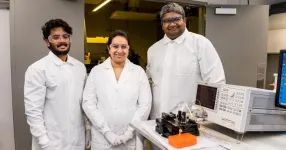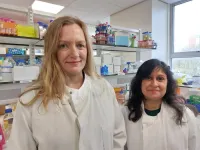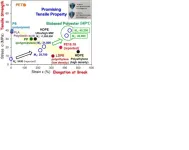(Press-News.org) NJIT has secured a $6 million grant from the National Science Foundation (NSF) to translate science and engineering discoveries into market-ready technologies that will improve quality of life in areas ranging from health care, to sustainable energy, to data privacy.
Awarded by the agency’s Directorate for Technology, Innovation, and Partnerships, the grant will accelerate the development of promising prototypes and enable market validation and other commercialization activities. It will also strengthen the university’s entrepreneurial culture by funding and organizing training workshops in technology translation for undergraduates, Ph.D. students, post-doctoral researchers and faculty, through the newly created Center for Translational Research at NJIT.
“NJIT’s goal is to become a regional leader in research translation,” said Atam Dhawan, senior vice provost for research and the grant’s principal investigator. “We have many game-changing technologies in the pipeline that are on the cusp of commercialization. This grant provides crucial backing for these projects.”
The grant, Dhawan explained, is designed to bolster NJIT’s Technology Innovation Translation Acceleration (TITA) program, which drills down on the potential commercial benefits of university research at earlier stages of the translation and market validation process. Launched by his office last year, TITA provides seed grants of up to $75,000 per project over three phases of development, as well as guidance and feedback from an industrial advisory board composed of inventors and entrepreneurs. Inventors must have external partners.
Over the next four years, the new NSF grant will supply seed funding of $50,000 to $100,000 per project to up to 10 TITA researchers. It will provide, for example, backing to help developers move past the initial proof of concept, including determining interest and acceptance by potential users, to identify purchasers of the technology, such as clinicians, municipalities or businesses.
So far, four projects have been awarded TITA grants under the current NJIT program. Sagnik Basuray, an associate professor of chemical engineering, for example, is developing a modular, point-of-care microfluidic device capable of quickly detecting multiple animal-borne diseases, including infectious diseases that can be transmitted between animals and humans. He noted that 75% of emerging pathogens originate in animals. “If we can measure them in the field easily inexpensively and quickly, we can prevent spillovers,” he said.
Salam Daher, an assistant professor of informatics, is working on software and hardware that will measure irregularly shaped wounds accurately and create customized wound dressings. “Healthcare workers are still using rulers and Q-tips to measure wounds,” she noted. “We use 3D-tracking technology. We can also simulate the progression of healing.”
The Center for Translational Research, directed by Dhawan, will serve as a hub for commercialization training and development on campus and will also organize workshops, forums and demonstration events to draw external collaborators, advisors and investors.
The center includes such facilities as the Microfabrication Innovation Center for making prototypes and the Microdevices Translational Research Center in NJIT’s VentureLink complex. The latter will include patient beds for healthcare device testing and an observation room for investors. Through the center, the grant will fund postdoctoral researchers who provide technical support to projects and students in NJIT’s Undergraduate Research and Innovation program who help advance them over the URI summer session.
The NSF award is the latest milestone in a recent string of research awards and honors.
A multidisciplinary team of biomedical engineers, chemists and biologists recently received $5.8 million from the National Institutes of Health to fund a biomedical research program designed to propel undergraduates into high-powered scientific careers focused on healthcare. The NIH training grant, the university’s first, will provide nine sophomores – three per year for the next three years – with full tuition and stipends, individual mentoring and career development experiences as they conduct high-level research, including writing a thesis, in preparation for top Ph.D. programs. One of the initiative’s goals is to diversify the scientific workforce by recruiting talented students from underrepresented groups.
Earlier this year, NJIT’s chapter of the National Academy of Inventors (NAI) received the organization’s inaugural Chapter of Excellence Award for programs that nurture and support inventions from their inception to translation, drawing on talent throughout the community: from undergraduates, to graduates students, to faculty.
In a statement, the organization said, “The mission of the NJIT Chapter is to recognize and promote invention in translational research and technology. The chapter's activities foster opportunities for faculty and student inventors to facilitate acquisition of intellectual property assets and learn entrepreneurial pathways from research and innovation to translation to market and commercialization, thereby impacting economic growth. For these worthy goals and programs that support them, the Chapter Excellence Award was awarded to the New Jersey Institute of Technology.”
Founded in 2021, the NJIT chapter quickly took on a larger role, as a regional hub to bring together researchers from other universities, policymakers and business leaders to share and disseminate ideas and forge partnerships to take on complex problems of national and international scale. At its meeting this past spring, for example, the chapter drew together for the first time the heads of research and innovation programs at eight universities in the metro region, including Princeton, Columbia and Rutgers, to discuss the benefits of collaborating on ideas, expertise and resources.
On campus, the chapter promotes translational research and its commercialization through campus R&D programs, grants, clubs and acceleration programs; offers invention-focused networking and educational activities, such as workshops and seminars on innovation and intellectual property development; and provides mentoring and advising services to faculty and student inventors on further development of IP assets.
Later this year, Dhawan, the chapter president, will co-chair the National Institutes of Health (NIH) meeting “Research and Innovation Translation Partnerships in Point-of-Care Technologies Conference and Technology Showcase.” He encourages researchers and inventors at NJIT to not only focus on scientific breakthroughs, but to consider the societal and economic conditions that may stand in the way of their implementation.
“Inclusion is all,” he said. “We must inform and engage the larger community as we develop new technologies. Without broad awareness and acceptance, we could just be spinning our wheels.”
From its inaugural meeting that focused on climate change, NJIT members and attendees from other institutions stated emphatically that success in slowing global warming will depend on a web of motivated and productive partnerships among distinct groups: scientists modeling changes and devising the means to curb them, nimble enterprises and a workforce able to translate inventions into tools, informed policymakers and, perhaps most importantly, engaged communities.
Chapter members must hold patents issued from the U.S. Patent and Trademark Office. Jamie Renee, the executive director of the NAI, gave the keynote address at the NJIT chapter’s induction ceremony for new members earlier this year.
Since 2014, 11 NJIT inventors have become NAI fellows, academic inventors who have demonstrated a “prolific spirit of innovation in creating or facilitating outstanding inventions that have made a tangible impact on quality of life, economic development and the welfare of society.” They include Nirwan Ansari ’82, Rajesh Davé, Atam Dhawan, Craig Gotsman, Somenath Mitra, Yun-Qing Shi, Kamalesh Sirkar, Gordon Thomas, MengChu Zhou, Treena Arinzeh and Tara Alvarez. NJIT President Teik C. Lim is also a fellow.
In awarding NJIT’s chapter with the inaugural excellence prize, the NAI organization noted, “Their President is Dr. Teik Lim, an NAI Fellow who has been an active supporter of the Academy for many years. Under his leadership, the Institute’s national reputation and its ranking as one of the top engineering schools in the country is assured. This year, Money magazine rated them as one of the best colleges in the United States. So it is no surprise that they have one of the best NAI Chapters as well.”
END
NJIT awarded $6 million from the National Science Foundation to commercialize campus inventions
2023-10-13
ELSE PRESS RELEASES FROM THIS DATE:
Fecal microbe transplants: B. vulgatus genes that correlate with early colonization
2023-10-13
BIRMINGHAM, Ala. – Fecal microbe transplants from healthy donors can treat patients with recurrent Clostridium difficile infections. However, after tens of thousands transplants, little was known about which donor strains provide long-term engraftment, and which engraft early after the transplant. Most failures of fecal microbe transplantation occur in the first four weeks.
Recurrent C. difficile infections occur after suppressive antibiotic treatments that knock out almost all of the normal gut flora. Patients suffer watery diarrhea, painful abdominal cramps, a feeling of sickness, fevers and weight loss.
In 2021, researchers at the Icahn ...
Funding will help further development of bacteriophages to combat disease on a commercial scale
2023-10-13
Pioneering work to develop effective and safe bacteriophages to combat disease has received an £800,000 boost.
The grant from the Biotechnology and Biological Sciences Research Council (BBSRC), is aimed at advancing the production of phages to combat disease in the veterinary field and bring them to market.
It has been awarded to Professor Martha Clokie, the Director of the Leicester Centre of Phage Research, and Dr Anisha Thanki who earlier this year successfully developed a bacteriophage ‘liquid’ product to prevent Salmonella ...
How weather phenomena affect ocean circulation
2023-10-13
The strength of the wind has an important influence on ocean circulation. This is particularly true for extreme events such as storm fronts, tropical storms and cyclones. These weather patterns, which last from a few days to a few weeks, will change in the future due to climate change. In particular, the average energy input into the ocean from mid-latitude storms is expected to decrease, while equatorial regions will become more active. Scientists call these different weather patterns “Atmospheric Synoptic Variability” (ASV).
The ...
Behind the scenes of social class on TV
2023-10-13
A Leeds researcher has teamed up with the BBC, Channel 4 and Candour Productions to analyse the role of social class, on screen and behind the scenes of TV production.
Funded by the Arts and Humanities Research Council (AHRC), the BBC and Channel 4 will work with the research team to support access to two drama productions, where the academics will analyse the series from production to reception.
Led by Beth Johnson, Professor of Television and Media Studies at the University of Leeds’ School of Media and Communication, the research will consider the backgrounds of people who produce TV, how social class is represented in each TV show, and how each series is ...
Researchers measure global consensus over the ethical use of AI
2023-10-13
To examine the global state of AI ethics, a team of researchers from Brazil performed a systematic review and meta-analysis of global guidelines for AI use. Publishing October 13 in in the journal Patterns, the researchers found that, while most of the guidelines valued privacy, transparency, and accountability, very few valued truthfulness, intellectual property, or children’s rights. Additionally, most of the guidelines described ethical principles and values without proposing practical methods for implementing them and without pushing for legally binding regulation.
“Establishing clear ethical guidelines and governance structures for the deployment ...
Opioid limits didn’t change surgery patients’ experience, study shows
2023-10-13
Worries that surgery patients would have a tougher recovery if their doctors had to abide by a five-day limit on opioid pain medication prescriptions didn’t play out as expected, a new study finds.
Instead, patient-reported pain levels and satisfaction didn’t change at all for Michigan adults who had their appendix or gallbladder removed, a hernia repaired, a hysterectomy or other common operations after the state’s largest insurer put the limit in place, the study shows.
At the same time, the amount of opioid pain medication patients covered by that insurer received ...
Health insurance and differences in infant mortality rates
2023-10-13
About The Study: In this study of more than 13 million infants, maternal Medicaid insurance was associated with increased risk of infant mortality at the population level in the U.S. Novel strategies are needed to improve access to care, quality of care, and outcomes among women and infants enrolled in Medicaid.
Authors: Colm P. Travers, M.D., of the University of Alabama at Birmingham, is the corresponding author.
To access the embargoed study: Visit our For The Media website at this link https://media.jamanetwork.com/
(doi:10.1001/jamanetworkopen.2023.37690)
Editor’s ...
County-level social vulnerability, metropolitan status, and availability of home health services
2023-10-13
About The Study: This study found differences in Medicare-funded home-based clinical care provision across the U.S. by county-level Social Vulnerability Index (a measure of socioeconomic deprivation), suggesting inequitable care access among homebound Medicare beneficiaries. Almost one-quarter of counties had low availability of home-based medical care clinicians coupled with high socioeconomic disadvantage.
Authors: Harriet Mather, M.D., of the Icahn School of Medicine at Mount Sinai in New York, is the corresponding author.
To access ...
Sustainability presents huge opportunities for business and financial institutions
2023-10-13
Why does sustainability matter for businesses and financial institutions? For centuries, competitive markets have been drivers for growth and improvement of quality of life. It is paramount to ensure these markets are compatible with sustainability and can adequately mitigate and adapt to climate change. These changes require a significant amount of capital, and knowledgeable investment and business professionals to deploy it
Sustainability: Business and Investment Implications explores the opportunities and challenges presented by sustainability, the energy transition and the decarbonization of the economy. Over the past years, the United Nations and global ...
New biobased recyclable polyesters exhibiting excellent tensile properties beyond polyethylene and polypropylene
2023-10-13
The research group of Professor Kotohiro Nomura, Tokyo Metropolitan University, in cooperation with the research group of Director Hiroshi Hirano, Osaka Research Institute of Industrial Science and Technology, has developed biobased polyesters from inedible plant resources, which can be easily chemical recyclable and exhibit promising mechanical properties in film than commodity plastics.
The development of high-performance sustainable, recyclable plastics is an important subject to realize circular economy. Biobased polyesters made from plant resources are expected to become promising alternative materials to polymers such ...






